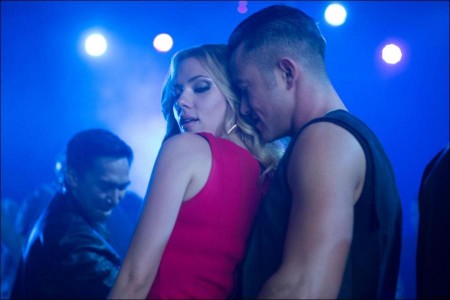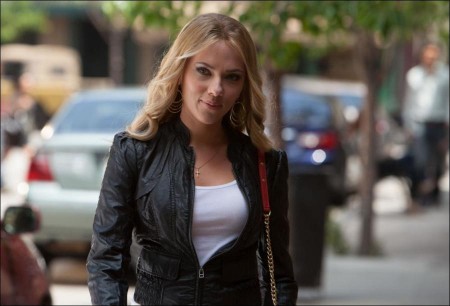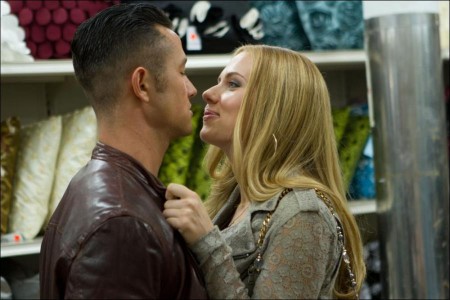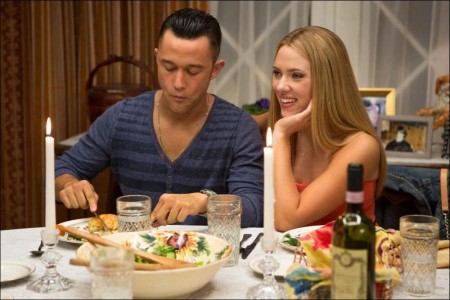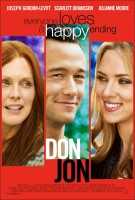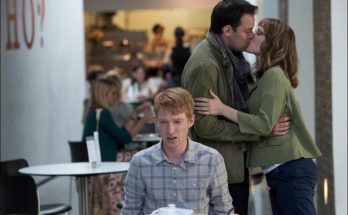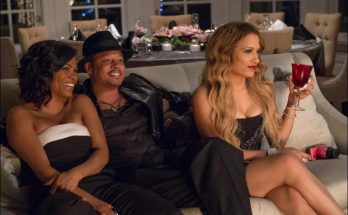Taglines: Everyone loves a happy ending.
Jon Martello (Joseph Gordon-Levitt) is a strong, handsome, good old fashioned guy. His buddies call him Don Jon due to his ability to “pull” a different woman every weekend, but even the finest fling doesn’t compare to the bliss he finds alone in front of the computer watching pornography.
Barbara Sugarman (Scarlett Johansson) is a bright, beautiful, good old fashioned girl. Raised on romantic Hollywood movies, she’s determined to find her Prince Charming and ride off into the sunset. Wrestling with good old fashioned expectations of the opposite sex, Jon and Barbara struggle against a media culture full of false fantasies to try and find true intimacy in this unexpected comedy written and directed by Joseph Gordon-Levitt.
About the Production (2013)
“I thought a romantic comedy about the relationship between a guy who watches too much porn and a girl who watches too many romantic Hollywood movies would be hilarious and get to the point. That’s how it started.” – Joseph Gordon-Levitt
Joseph Gordon-Levitt isn’t about to pull any punches. In his provocative, fun, and appealingly frank R-rated comedy, Don Jon, the writer, director and star dives into a host of thorny topics: objectification, intimacy, and today’s media, to name a few. And he does it with the cool-headed forthrightness that’s defined him as an actor, whether it’s playing a lovelorn outsider in (500) Days of Summer, a cancer survivor in 50/50, or a steely cop in The Dark Knight Rises. Don Jon is a hilarious and refreshingly honest dissection of modern American machismo.
While Don Jon might be the first mainstream American comedy to highlight pornography – the reasons why we watch, why we continue watching – Gordon-Levitt is quick to point out his debut feature isn’t really about porn at all. “I wanted to tell a love story,” he says. “But what I’ve observed is, what often gets in the way of love is how people objectify each other.”
A life-long actor who’s garnered increasing fame in his film career, Gordon-Levitt is no stranger to the vagaries of objectification, particularly at the hands of the media. “Sure, maybe I want to tell this story because I’ve felt objectified in my life,” he says. “But it happens to everyone, to friends of mine outside Hollywood. We put expectations on each other, and rather than engaging with a unique individual and listening to what the other has to say, right at this moment, we put people in boxes with labels.”
“I also wanted to compare pornography to the rest of our media, even perfectly mainstream stuff,” Gordon-Levitt continues. “We see it all the time in movies, TV shows, or commercials, especially commercials. A person–usually a woman–is reduced to a thing, a sex object. And whether the image is rated X or, you know, approved for general viewing audiences, the message is the same. That’s what I wanted to talk about, and sorta make fun of.”
While Jon objectifies women with porn, his new girlfriend, Barbara, played by Scarlett Johansson, is distracted by fantasies of her own. A drop-dead gorgeous Catholic girl who’s by no means a prude, Barbara nevertheless has very particular ideas of what a relationship should look like, many of which are gleaned from Hollywood romantic comedies. “Women grow up with this idea of what a man should be, whether that comes from films or from our parents or fairytales,” says Johansson. “So, the same way Jon has created this fantasy world as a means of escaping what’s in front of him, Barbara creates this idea of the perfect future, the perfect life, the perfect man, the perfect family. Her ideals don’t leave room for the humanity of a relationship.”
“We learn these expectations everywhere,” adds Gordon-Levitt. “From our families. We get it from our friends, from the church we go to. And we get it from different kinds of media. That in particular fascinates me.”
This mutual objectification, for Gordon-Levitt, forms the heart of Don Jon’s central love story: “I thought a romantic comedy about the relationship between a guy who watches too much porn and a girl who watches too many romantic Hollywood movies would be hilarious and get to the point. That’s how it started.”
While Don Jon took about four years to come to fruition, Gordon- Levitt’s desire to become a filmmaker began much earlier. “I’d always played around with video cameras, even when I was a little kid. Then, for my twenty-first birthday, I got myself my first copy of Final Cut, the video editing software. Since then I’ve made tons of little short films and videos. Countless, probably hundreds of them. I definitely don’t think I would have been able to direct a feature if it hadn’t been for all that experience.”
After several screenwriting attempts that bore no fruit, Gordon- Levitt landed on the central idea for Don Jon and realized it would be the ideal project for his directorial debut. He says, “This movie is really a character study with no car chases or explosions, no scenes in outer space. It felt like something I could do and I was very much intent on having total creative control.
He spent two years pondering the story, eventually landing on the legendary, fictional character of Don Juan himself. A tragic figure, Don Juan never learns to amend his womanizing ways and is routinely ruined by his shortcomings. Gordon-Levitt wanted to find a more positive ending. “I guess I’m an optimist. I like to think people can change. And I like movies with a good balance of darkness and light. I wanted the story to have that light at the end of the tunnel; I wanted it to have hope,” he says.
It wasn’t until he found himself in Vancouver shooting the comedy 50/50 with Seth Rogen and Evan Goldberg that Gordon-Levitt finally landed on the right tone for the project. “I was really inspired by Seth and Evan’s approach to 50/50. It was funny as hell, but the humor was coming less from gags, and more from the characters. And because it was rated R, it could be real, people could talk how they really talk, and do the things they really do. That’s when I first landed on the comedic tone and started picturing Jon as this East Coast guy with the gym body and the shiny hair. The idea of playing a character like that made me laugh, so I kept going with it.”
One thing that remained constant for Gordon-Levitt, however, was the image of Scarlett Johansson in the role of Barbara Sugarman. An admirer of her performances in films like Lost In Translation and Vicky Christina Barcelona, Gordon-Levitt flew to Albuquerque to meet her on the set of The Avengers so they could discuss the script before she read it. “We had a long conversation about men and women, love and lust, connection and objectification, media, family, religion, you name it,” Gordon-Levitt recalls. “Shortly thereafter, she read it, and fortunately, she liked it. I don’t know what I would have done if she hadn’t!”
Says Johansson, “I grew up in New York and when I read the script I thought, I know this character. She’s a nice Catholic girl. She has a bit of an attitude. She’s totally absorbed in what she feels she’s entitled to, and it completely blinds her to the reality of a relationship. She’s unrealistic in that way.”
The other, more unlikely, woman in Jon’s life is Esther, a fellow student in Jon’s night class played by Julianne Moore (“Game Change,” Far From Heaven, The Hours, The Big Lebowski). When Esther busts Jon furtively watching porn on his cell phone during class, the moment sparks a frank, and at times quite rocky, rapport. Along the way, Esther introduces Jon to an entirely new way of thinking, leading him on a journey of unexpected growth.
Moore admits she was initially reticent to read Gordon-Levitt’s script; she didn’t want to appear in another movie about pornography after a career-defining turn as an adult film actress in Boogie Nights. Everything changed when she read Gordon-Levitt’s writing. “I just loved it,” Moore recalls. “It’s not about porn at all. It was really inventive and went in ways that were completely unexpected. The journey from that kind of objectification all the way to intimacy is a really transformative one. And to do it through the lens of porn is – it’s just incredibly refreshing and original.”
Moore particularly enjoyed portraying Esther’s enviable lack of self-consciousness. In the film, Esther is grieving a great personal loss; but this emotional wound paradoxically opens her up to the unexpected possibilities of life. “Esther is extremely present and doesn’t seem to have an awareness of how she’s presenting herself,” Moore explains. “I like how innately curious she is about the world and about Jon. She has no agenda about what’s happening right in front of her.”
In the role of Jon’s father, Jon Sr., Tony Danza (“Taxi,” “Who’s The Boss”) plays a working class Dad whose obsession with televised sports mirrors his son’s addiction to porn. “There’s a scene where Jon, Sr.’s in the middle of telling this wonderful story about his wife and how beautiful she was back then,” recounts Danza, “and it’s this touching moment and everyone says, ‘Oh, that’s such a great story.’ Then all of a sudden, he’s screaming at the television because there’s been a big play. He doesn’t even realize that he’s doing it.”
“I think with Tony’s performance you really see how Jon Jr. inherited this habit of escapism,” says Gordon-Levitt. “In a way, it doesn’t matter whether it’s through porn or sports. It’s a disconnection from what’s really in front of you.”
For his own turn in front of the camera, Gordon-Levitt relished the opportunity to play a character audiences might not expect from him. “I knew that if I was going to make my own movie,” he says, “I wanted it to be something I wouldn’t be able to do otherwise. Otherwise, what would be the point?”
Don Jon (2013)
Directed by: Joseph Gordon-Levitt
Starring: Joseph Gordon-Levitt, Scarlett Johansson, Julianne Moore, Tony Danza, Glenne Headly
Screenplay by: Joseph Gordon-Levitt
Production Design by: Meghan C. Rogers
Cinematography by: Thomas Kloss
Film Editing by: Lauren Zuckerman
Costume Design by: Leah Katznelson
Set Decoration by: Cindy Coburn
Music by: Nathan Johnson
MPAA Rating: R for strong graphic sexual material and dialogue throughout, nudity, language and some drug use.
Studio: Relativity Media
Release Date: September 27, 2013
Visits: 103
